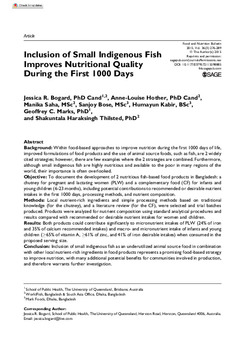Inclusion of small indigenous fish improves nutritional quality during the first 1000 days

Citation
Bogard, J.R. et al. (2015). Inclusion of small indigenous fish improves nutritional quality during the first 1000 days. Food and Nutrition Bulletin, 36(3): 276-289
Key contributing factors to undernutrition in low-income countries, including Bangladesh, are low dietary diversity in the diets of women and low nutrient density of traditional complementary foods (CFs) for infants and young children. Several plant-based processed CFs have been developed in Bangladesh, however, all have required fortification with vitamins and minerals to achieve desired nutrient densities. There are few examples in the literature of a combined approach using animal source foods (with the exception of milk) in processed food products targeted at the first 1000 days. There are even fewer examples of the use of fish in food products, despite widespread recognition of their nutritional value (particularly of small indigenous fish), acceptability, and popularity in the diets of many in low-income countries with rich fisheries resources. Two new fish-based food products targeting improved nutrition in the first 1000 days that focus on using local, culturally acceptable, nutrient-rich ingredients are presented in this paper. It concludes that inclusion of small indigenous fish as an underutilized animal source food in combination with other local nutrient-rich ingredients in food products represents a promising food-based strategy to improve nutrition, with many additional potential benefits for communities involved in production, and therefore warrants further investigation.
Permalink
Date Available
Type
Publisher
Countries